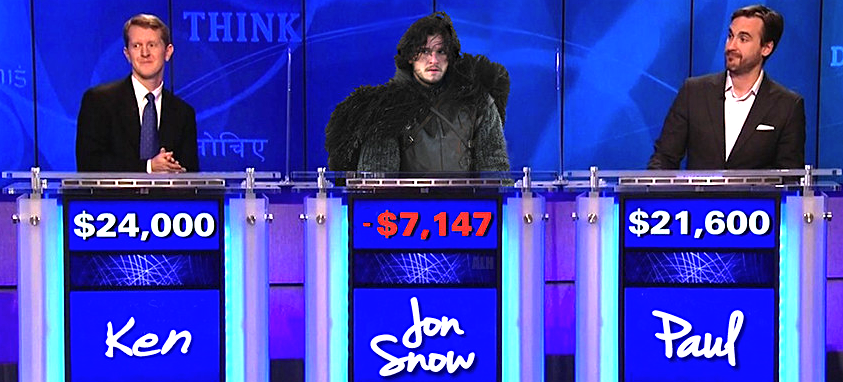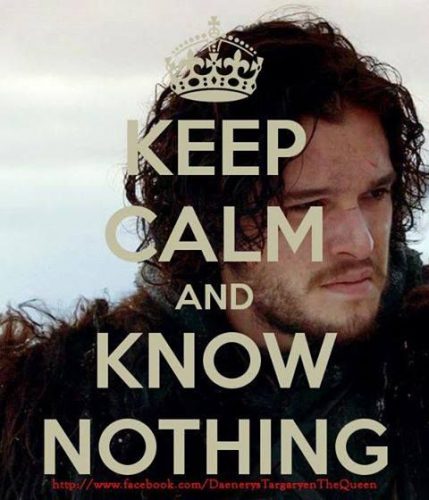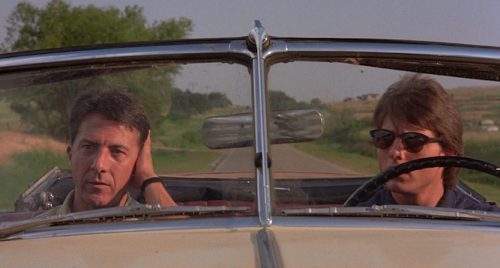
 I used to be a connoisseur of television, my DVR filled with hour-long nuggets of narrative brilliance, my Netflix recommendations apt reflections of a carefully-curated viewing history. Then I had kids and grew exhausted and, in the late hours of the night (read: 8-10 pm), developed a preference for more fun-sized and less emotionally-involving small-screen moments. I also began to receive more of my entertainment on the run, on the drive to my son’s preschool or during laps on the track at my gym, which is why podcasting opened up a welcome form of media diversion. Recently I caught the Invisibilia episode that DZ wrote about last month, “The Problem with the Solution.”
I used to be a connoisseur of television, my DVR filled with hour-long nuggets of narrative brilliance, my Netflix recommendations apt reflections of a carefully-curated viewing history. Then I had kids and grew exhausted and, in the late hours of the night (read: 8-10 pm), developed a preference for more fun-sized and less emotionally-involving small-screen moments. I also began to receive more of my entertainment on the run, on the drive to my son’s preschool or during laps on the track at my gym, which is why podcasting opened up a welcome form of media diversion. Recently I caught the Invisibilia episode that DZ wrote about last month, “The Problem with the Solution.”
Over the span of a couple of days, during trips with my kids to the library/museums (Target) and cool-downs on the track, I listened to the story of Geel, Belgium and its treatment of the mentally unwell–specifically, their placement in and cohabitation with host families who employ no strategy other than acceptance. The concept both startled and encouraged me; it made me want to be so unafraid as to be willing to welcome such an element of uncertainty into my own seemingly-staid existence. Then I realized that such an element has always been a part of my life–uninvited, maybe, but present, by the unyielding work of grace.
I have written (and spoken) about our journey with our son extensively, so here’s hoping that when he’s old enough to bear witness to it all, he’ll possess a magnanimity of spirit absent from his maternal branch of the family tree; and here’s hoping you’ll indulge more of my musings on his (our) story thus far. When cohost Lulu Miller interviewed her dad and sister at the end of the episode about their shared and disparate experiences with the sister’s mental illness growing up, I found myself in tears right there at the traffic light with my sons in the backseat. Emotionally steamrolled by the recounting of a particular incident, I couldn’t help but compare it to so many I’ve shared with my son over his four years for their similar attributes, parental helplessness chief among them.
To quote George Washington, “Can I be real a second? For just a millisecond? Let down my guard and tell the people how I feel a second?” We received a spectrum diagnosis for my son a year and a half ago, and when I exited the developmental pediatrician’s office beside him and we trudged through melting snow, I felt okay. “He’s the same kid,” I told myself as he studied the white patches on the sidewalk. “This doesn’t really change anything.”
I held that protective pose together for a couple of weeks until a birthday party we attended for a boy in his preschool class. I watched the other kids bounce on indoor trampolines as my son explored the room, declining to be corralled by netting or hurtled into the air. I pushed him toward the group picture he wanted no part of. I handed him his preferred cup when he was offered a juice box I knew he wouldn’t take. For an hour and a half I subconsciously noted every single difference between him and the other children, and by the time we got into the car, I was devastated. It’s always going to be hard for us, was all I could think. EVERYTHING is always going to be hard. I couldn’t breathe, couldn’t stand to think about what life might look like weeks and months and years into the future–how he might be hurt, how this called on me to parent from a place none of the books prepared me for, how it was all just so fucking unfair. We got home, where I opened a bottle of wine and sobbed.

For the time since then I’ve wandered the gray area between acceptance and denial. On the acceptance side: there are obvious differences between my son and some kids. For one, he didn’t begin speaking until the end of last year. He gets anxious in unfamiliar places. He tends to prefer solo play. He’s introspective and quiet in groups. On the denial side: ME, TOO WHEN IT COMES TO ALMOST ALL OF THAT. He’s endured an already-lengthy medical history, including spinal surgery, for his age, which undoubtedly has affected his behavior. He’s made breathtaking progress in a year’s time, causing many therapists to wonder if the initial diagnosis was accurate. I’ve found myself shying away from the “label” he’s been given even while embracing it to receive services from which he benefits. Bottom line, I don’t fully accept what occurred in that doctor’s office on that winter afternoon to be the whole answer.
And now, eighteen months later, I’m okay with that. I mean, you know, as “okay” as a parent and control freak can be with uncertainty. I’ve come to realize what really bothers me about the diagnosis–like people thinking they know my son because they’ve seen Rain Man (not even close), or various other misunderstandings that accompany an umbrella-type disorder that is constantly changing. If you’d grab that soapbox over there, I’d be happy to climb up on it and preach about the ridiculousness of the word typical describing anyone these days, or the ever-changing DSM (on its fifth version, currently) and what that says about defining people by constantly-vacillating criteria. Beyond the more objective qualms, though, I know that, as a mother, my emotional qualms also loom large: my fierce protectiveness of my son and my commitment to his truest story being told, to nothing unfairly holding him back.
What overshadows all of that, though, is that I’ve gained more ground in accepting what I know, from my own evidence-based research, to be true: that his well-being is not ultimately in my hands. That while the therapies and strategies we’ve implemented are “working,” they aren’t going to be what saves him. Because, like all of us, that’s what he needs: to be saved, not fixed.

Early in our journey, I was too frequent a visitor to message boards and Facebook pages that claimed to be about us–our story. I witnessed, over and over, people who found overwhelming comfort in a diagnosis I couldn’t even accept. They were taking solace in there being an “answer” to everything that had been going on with their kids. And, armed with that answer, they forged ahead into therapies and dietary adjustments and vaccine crusades and functional medicine, and all I wanted to do as I watched them was take a nap. As grace would have it, I was directed to a friend of a friend whose son had similar beginnings. The only strategy he offered? “Stop reading books and websites. Read your child. And I know it may not feel like it now, but you’ll see one day that you have been given a gift.”
Even with surrender, with acceptance of our lot in life, the law can creep in: now that I’ve okayed the presence of this struggle, we say, I can face it with tactics like prayer and Bible-reading and myriad other spiritual and practical disciplines. And these can all be good. They can also be distractions. I look at my son and am tempted to reduce his story to a series of goals: master potty-training. Perfect his ck sounds. Get him to use another cup. Then, sometimes–not always, but sometimes–I remember what I was told: “Read your child.” In those moments I have to abandon solution-seeking in favor of stillness. Of not knowing. That’s when I really see him. And while I’m already being still, why not go ahead and know who is God?
Embracing, or just accepting, uncertainty opens my eyes to how limited I am by my own sense of control–how a life within my boundaries allows for no breathtaking moments. How I don’t need, ultimately, more knowledge–because what I need is help. Rescue. Something altogether more powerful and less self-centric to pull me out of the direness of this broken world and my own messy encounters with it, and relocate me to a place that may not be safe but is good–what some might even call a gift.
“I didn’t know what I was doing as a father,” says Lulu’s dad in “The Problem with the Solution” through racking sobs. Me neither. Me neither. And I am constantly proving it. Thanks be to the God who supplied the only answer I’ll ever really need in himself.

COMMENTS
4 responses to “The Good News of Knowing Nothing”
Leave a Reply













Thanks to you all at MBird for the heads up on Invisibilia, especially that episode – thanks for this post too.
Hi Stephanie, this is a great post! And good on you for slipping in a Hamilquote!
We have all been rescued, praise God.
Applause!!!!! Again, just what I needed to read in my parenting journey.